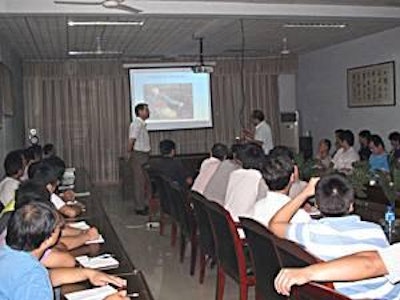
The business of breeding pig stock and genetics relies on more than providing highly productive genotypes. Ongoing stock training and technical support is a significant part of the package as those with joint-venture partnerships in China have discovered.
Training and technical support is a very marketable commodity, as the Chinese want the brains as well as the brawn when it comes to pig production.
Training pays off
The pig sector also is becoming increasingly important in the West where pig farm employees are being asked to take on increasingly complex tasks, as more pig producers invest in high-tech equipment to boost production and mitigate the sector’s impact on the environment. As one veteran pig industry observer commented recently, “Stock people have to be computer experts and environmental engineers, as well as everything else these days. Training should be a vital element on all pig units that want to prosper.”
In Europe, the Danish Pig Research Institute is taking a lead. At its annual conference, more than 65 workshops over two days provided training in essential skills for pig farm employees. Several of the workshops were in English to accommodate the increasing number of foreign employees working on the country’s pig farms.
The short courses covered a variety of topics, ranging from climate and temperature control for weaner and finisher units and efficient servicing for sows and gilts to feed conversion ratios, conserving energy and practical tips on how to move pigs without causing too much stress. They are highly valued by both pig producers, who are always keen to enroll as many employees in the courses as possible because they know they help boost performance, and the workers themselves, who are keen to learn from the experts.
Training Chinese pig workers
And it is the same in China, where Rattlerow Seghers (RA-SE Genetics), a Belgium-based subsidiary of the UK pig breeding and genetics company Rattlerow Farms, began trading more than 12 years ago. “The Chinese pig sector faces a host of key challenges that may still stilt progress, says Stefan Derks, managing director. “Herd health and pig disease control are major problems and the lack of adequately trained and experienced managers and production staff will have to be addressed.”
From the outset, his company provides its Chinese partners with a high-degree of technical support and staff training to ensure people managing its pig herds have the skills and confidence required to maximize productivity across the pyramid. “Chinese pig unit managers and stock people are innovative and keen to embrace new technology. However, they are inexperienced when it comes to managing western genotypes,” says Ian Gillies, Rattlerow AI manager and training specialist.
Sharpening skills
According to Gillies, most pig farms are operating with a skills deficit as the staff often lack the expertise needed to maintain herd health status and reproductive performance. Few of them realize what European pig genotypes are capable of achieving in terms of productivity or what is required to unleash their potential.
And realizing that potential can prove increasingly difficult given the challenges faced by the Chinese pig sector in terms of poor health, the extreme climate and inconsistent feed quality, commented Gillies.
“The main focus of my training sessions in China is to raise pig reproductive performance at both nucleus and commercial level,” says Gillies. “Genetically, the genotypes we have in China are more than capable of producing what the market wants – and doing it consistently. However, compared with the average sow performance levels in Europe, Chinese pig breeding herd productivity is low. In many cases, performance is compromised because sows are not being managed to the best of their ability.”
Fundamental procedures
“Most stock people do understand the pig reproductive cycle and how artificial insemination works, but they are not as proficient as they could be when it comes to understanding the subtleties of oestrus and service management,” says Gillies. “Fundamental procedures such as stimulation, boar presence, oestrus detection, insemination technique and the timing of service are not fully understood.”
“Attention to detail is not always a strong point, but I find that pig workers are very enthusiastic, eager to learn and extremely capable of achieving better results,” he said. “Many of the stockmen just need to grasp the specifics of the pig reproductive cycle and why certain procedures must be carried out and when. Once they link the science with the practical aspects they can understand why specific routines are vital and why timing is so critical.”
He pointed out that training is highly valued in China and most stockmen are eager to learn. "Chinese stock people are not used to seeing managers or professionals carry out manual tasks. Actions tend to speak louder than words here, and it builds respect for what you are doing and helps diffuse some communication issues.”
Many pig breeding companies, including Rattlerow have discovered that working alongside Chinese pig companies to help them manage their genetic resources are the best way to ensure progress and sustained improvement across the entire production chain.
Rattlerow Seghers manages the HEBEI nucleus from its central office in Belgium. A dedicated team of pig genetic specialists collates nucleus performance data, which is used to calculate indices and BLUP values. The information is then used for selection criteria and mating recommendations back in China and ensures that only pigs of the highest genetic merit are used within the nucleus.
The system combines the most advanced European technologies and expertise with that of trained local specialists, and it appears to be working well. From RA-SE’s perspective this global training and data management system also generates an enormous amount of useful information. Data is collected from pig breeding stock located throughout the world which is carefully analyzed.
It’s a valuable resource and provides insight into how its genotypes are performing worldwide, across different pig production systems and under varying environmental conditions.

















